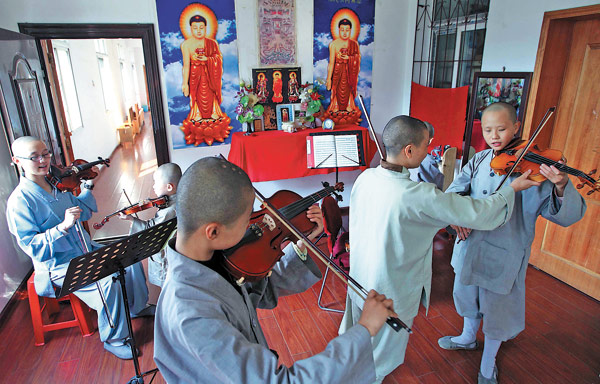Religious harmonies
 |
|
Monks and nuns from the Guangxuan Art Troupe practice stringed instruments seven hours a day, when they're not chanting sutras or doing hard labor. Photos by Wang Jing / China Daily |
Tiantai Temple monks believe in music's meditative powers. Lin Qi finds out why.
Shi Zhengxing went to the prestigious Wuhan University to become an engineer but instead became a monk in a band.
The 23-year-old Tiantai Temple monk turned viola player performs such works as those by German composer Johann Pachelbel with several other monks and nuns in Hubei province.
The group comprises 23 violins, five violas, four cellos and two basses. They rehearse nightly for two hours before their 8-pm bedtime. The band has been together for four years.
Shi Zhengxing says he couldn't tell the difference between a viola and violin when he joined a year ago. The monk explains he took to Buddhism after joining a campus education and culture society at school, where he studied physics.
He was surprised to discover playing stringed instruments was an important part of temple life when he came to the monastery, which is about four hours' drive outside of Wuhan, after graduating last year.
The monastery's 65-year-old abbot Shi Wule introduced music as a means for meditation when he took over in 2004. He had majored in piano and violin at the Wuhan Conservatory of Music.
"I was inspired by the abbot's pioneering initiative and his ambition to establish a professional orchestra at the temple, so I followed in his footsteps," Shi Zhengxing says.
Shi Wule became a monk at Hong'an county's Taiping Temple in 2000.
One day, he was playing violin in the temple when some visitors stopped to listen.
"They were not Buddhists, actually," Wule recalls.
"I suddenly realized Western musical instruments could also convey Buddhism's spirit."
This epiphany inspired him to encourage the monks and nuns to cultivate their interest in music as a way to cultivate their hearts and minds.
In 2008, Shi Wule founded the Guangxuan Art Troupe, which he named after his late master. The troupe comprises about 40 of the temple's 80 monks and nuns. Most are teenagers or are in their 20s.
Besides practicing on their instruments, troupe members also receive vocal and dance training. They practice seven hours a day, and once a week they are taught by professionals from art troupes and music schools in Wuhan.
"I was terrified the first time I plucked a string instrument," Shi Zhengxing recalls. "It wasn't the sound of music but, rather, the hoarse voice of an old man.
"We sometimes forget what our teachers have taught us and make little progress for weeks or months on end. It's a painful process."
Shi Zhengshu says she had no interest in violin until she saw the 1984 film Amadeus.
"I realized I hadn't done my best," the 23-year-old recalls.
"If I worked harder, I could produce notes as beautiful as those in the film. The cats in the temple used to run away when we rehearsed and the older lay Buddhists compared the sound to dying animals' screams. Now, they say our performances are pleasant to the ears."
Shi Zhengyong says making music is a meditative process that cools his hot temper.
The 23-year-old Bozhou, Anhui province, native was set to inherit his parents' medicinal herbs wholesale business after finishing high school.
"I didn't know what I really wanted to do," he recalls.
















